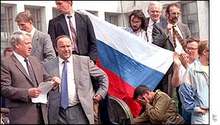Former Russian President Boris Yeltsin died today. Yeltsin was president from 1991 to 1999 and became the first democratically elected ruler of Russia. His mistakes are many and well-known. They include the bloody first Chechen War (1994-96), which set the stage for the even worse second Chechen conflict that rages to this day; Yeltsin himself may have come to regret his role in initiating the conflict. Other errors include his failure to fully root out the old communist nomenklatura (which is now making a comeback under his successor), the massive corruption that flourished under his rule, and the establishment of a constitution that concentrates excessive, almost authoritarian, power in the hands of the president. And of course there was his terrible mistake in appointing former KGB colonel Vladimir Putin ashis successor.
I do not mean to belittle the significance of these failures. But on this day it is important to emphasize Yeltsin's successes, achievements that in my view are mostly underappreciated. First and foremost, Yeltsin played a key role in the collapse of communism in the Soviet Union, particularly during the attempted August 1991 coup by communist hardliners when Yeltsin risked his life to lead the resistance to the coup. The coup's failure was the death knell of communist rule in the Soviet Union. We all owe a Yeltsin a great debt for this service alone, even if he had done nothing else positive.
Yeltsin (left) stands on a tank during the 1991 coup.
But in fact he had several other important achievements to his credit. Of all of Russia's many rulers since the country was unified some 500 years ago (excluding the shortlived Provisional Government of 1917), Yeltsin was the only one who permitted almost complete freedom of speech and religion. The 1990s was the only time in Russian history when adherents of almost every ideology were free to express their views and criticize the government. Adherents of virtually every religion were for the first time free to practice their faith. Yeltsin also deserves credit for dismantling most of the Soviet Union's huge military-industrial complex, which once accounted for anywhere from a third to a half of GDP. Finally, the Yeltsin era saw a vast expansion of both political and economic freedom, even if tainted by corruption. Here too, there was greater progress than under any other Russian ruler, with the possible exception of the 19th century reformist Czar Alexander II, who abolished serfdom and thereby freed the majority of the population from a state of near-slavery.
There has been considerable regression under Yeltsin's successor Vladimir Putin, who has cracked down on free speech and reconcentrated power in the hands of the central government. Yeltsin, of course, deserves considerable blame for this, both for appointing Putin as his successor and for helping to foster a political climate in which a more authoritarian leader could succeed. Yet even under Putin, Russia has not come close to reverting to the dark days of communism. And there is reason to hope that the government will be forced to liberalize once more as the westernized middle class becomes larger and more powerful.
Boris Yeltsin was a man of many faults who made some grave errors. But history may well conclude that the great good he did outweighs the not inconsiderable evil.
